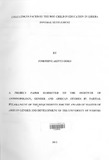| dc.description.abstract | This was a cross-sectional study on challenges faced by the boy-child in slum education in Kibera informal settlement. Specifically, the study sought to describe the socio-cultural challenges and economic challenges facing boy-child in education. The study was guided by the empowerment framework originally developed by Freire (1973). Sampling was purposively done to reach boy-child drop-outs in Kibera and to identify key informants to the study. Data were collected through in-depth interviews, key informant interviews, and case narratives and analyzed thematically. The study findings indicate that drug use and abuse, HIV / AIDS and, boy-child bereavement, emphasis on girl-child at the expense of boy-child, family background and lack of role-modeling for boy-child are major socio-cultural factors leading to drop-out.
Similarly, the economic causes of boy-child drop-out include: preference for a trade, quest for money, parental decision, and lack of employment opportunities, hawking/street trading, and long process of education to realize the returns. This study concludes that challenges to boy-child's education in the informal settlement do not operate in isolation but combine to deny the boy-child education opportunities leading to drop-out. This is because economic vulnerability of the boy-child's family background is seen as a precursor to social delinquency that eventually leads to drop-out from school.
The study recommends that the government through city education department should seek collaboration with development partners in providing scholarship for the boy-child just like their female counterparts. This effort should be complimented with fair considerations in the disbursement of the constituency bursaries to cater for the boy child's vulnerability and lack of school fees. Finally, the study recommends that mentorship programs should be introduced around schools in Kibera and boy-child and their parents target with information to prevent parents from pulling their children out of school. | en_US |

